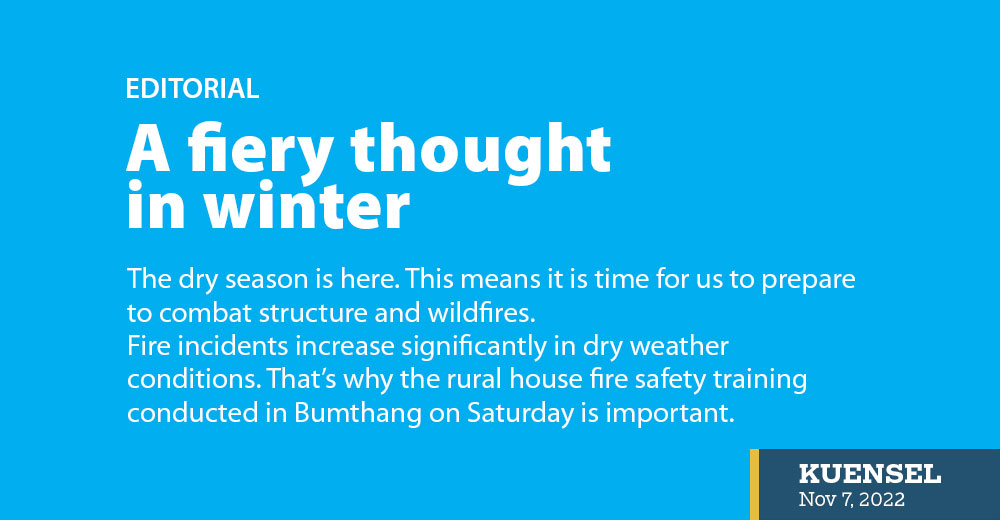The dry season is here. This means it is time for us to prepare to combat structure and wildfires.
Fire incidents increase significantly in dry weather conditions. That’s why the rural house fire safety training conducted in Bumthang on Saturday is important.
Bumthang is considered one of the vulnerable places for fire hazards owing to more traditional houses, cold weather and high usage of fire. The training is expected to ensure preparation, precaution, and prevention to address fire-related problems. Such training must be held in every dzongkhag and participation should be encouraged from almost every village.
The causes of wildfires are many. In fact, in less than a decade, there have been more than 1,400 forest fire incidents in Bhutan; about 99 percent of fires were anthropogenic (originating due to human activity) in nature and occurred during the winter.
We often just point to the weather, but what we must understand is that most wildfires occur due to human carelessness. According to a global study, improperly extinguished campfires, lit cigarette butts, arson and improperly burnt debris are responsible for about 85 percent of wildfires.
In Bhutan house fires are caused by electrical short circuits, LPG gas stoves, and traditional hearths. The participants were taught how to use fire safety materials, ensure safe electrical circuits, fire disaster causes and implications, among others. As reports come after every house fire in the country, safe electrification of homes is of utmost importance.
The Forest and Nature Conservation Act 1995 prohibits any fire in government forests, irrespective of forest type and vegetation sensitive to fire. The National Forest Policy of Bhutan 2011 prohibits fire in fire-sensitive ecosystems but allows the use of fire as a management tool in fire-adapted ecosystems. These measures, unfortunately, have not been enough.
In 2017, under the Royal Command, the first interagency SOP was formulated and implemented for Thimphu. Under this arrangement, an Interagency Forest Fire Coordinating Group was formed for Thimphu, consisting of members from the authorities concerned. Every dzongkhag, town, and village must have groups at the ready, especially in the winter when the threat is high.
In Bhutan, the problem is not just wildfires. Fires breaking out in rapidly growing settlements are even more serious. The way settlements are growing in the peripheries of our towns is worrying. And we seem to conveniently blame fire incidents on short circuits and forget about them. When it comes to the electrification of homes, safety should be given the top priority rather than cutting costs.
We often blame the firefighters for not doing enough but choose to remain blind to our own carelessness. Such gaps must not exist. It is important that we embed protective mechanisms wherever possible, especially in places where the threat of fire is the biggest.
The fire of concern must burn in every Bhutanese heart.


